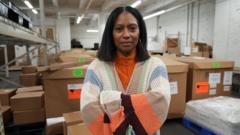With Donald Trump set to assume office once again, businesses across the U.S. are gearing up for the anticipated effects of his proposed tariffs on imports from key trade partners like China, Mexico, and Canada.
US Businesses Brace for Impact of Potential Trump Tariffs

US Businesses Brace for Impact of Potential Trump Tariffs
As Trump signals new tariffs, American companies scramble to adapt to possible changes.
When handbag designer Sherrill Mosee heard her autumn shipment of 2,700 bags would not arrive as scheduled, she initially hesitated. However, with Trump's re-election, urgency swept through her Philadelphia-based company MinkeeBlue, prompting her to reconsider her supply chain strategy. “We’ve got to bring those in,” said Mosee upon realizing the impact of tariffs could arise swiftly under Trump’s first-day action proposals, which include steep levies of 25% on goods from Canada and Mexico and an additional 10% on imports from China—just as he had during his first term in office.
As news of potential tariffs spreads, businesses are feeling the pressure to reevaluate their operations. Executive Chris Caton from Prologis noted an immediate uptick in companies securing warehouse space to stockpile goods amid looming tariff threats. Economist Wendy Edelberg emphasized that merely the uncertainty of policy can have immediate repercussions on economic growth, regardless of whether these tariffs will come to fruition.
Notably, big players like Steve Madden and Stanley Black & Decker have already adapted their strategies, planning to shift manufacturing away from China or prepare for cost adjustments in response to the looming tariffs. Even retail giants are discussing similar moves, fearing that hampers on trade could lead to increased costs and potential shortages in the marketplace.
While some experts speculate that Trump may moderate his tariff ambitions, the mere speculation has triggered immediate actions among small and large business owners. Martin Pochtaruk, CEO of Heliene, a Canadian solar panel manufacturer, shared past struggles with tariffs, bringing a wave of anxiety to the foreground. "We are talking to all of our clients... There is a lot of anxiety,” he expressed regarding pricing fluctuations and material shortages.
Economists warn that though tariffs might protect certain sectors, they also inflate costs significantly for consumers, with projections indicating possible annual costs rising between $46 billion to $78 billion for staple goods including household appliances and apparel. The National Retail Federation highlighted that the cost of consumer goods could see sharp increases overnight, questioning how such measures reconcile with Trump’s promises to lower prices for Americans.
The conflict between promising tariff action and maintaining economic stability was underscored by Trump’s intentions directed at Mexico—essentially imperiling a bilateral trade framework that has kept grocery staples stable. Experts have voiced optimism that despite risks, existing market 'guardrails' could potentially moderate the fallout from aggressive trade policies.
However, for fledgling businesses like Mosee's, the future feels precarious. As she weighs prospects of partnering with suppliers in places like Cambodia and India, she faces the harsh reality of an uncertain environment. “It’s going to be hard," she concluded, standing at the precipice of your business’ future amidst the anticipated shifts in trade policy.
As news of potential tariffs spreads, businesses are feeling the pressure to reevaluate their operations. Executive Chris Caton from Prologis noted an immediate uptick in companies securing warehouse space to stockpile goods amid looming tariff threats. Economist Wendy Edelberg emphasized that merely the uncertainty of policy can have immediate repercussions on economic growth, regardless of whether these tariffs will come to fruition.
Notably, big players like Steve Madden and Stanley Black & Decker have already adapted their strategies, planning to shift manufacturing away from China or prepare for cost adjustments in response to the looming tariffs. Even retail giants are discussing similar moves, fearing that hampers on trade could lead to increased costs and potential shortages in the marketplace.
While some experts speculate that Trump may moderate his tariff ambitions, the mere speculation has triggered immediate actions among small and large business owners. Martin Pochtaruk, CEO of Heliene, a Canadian solar panel manufacturer, shared past struggles with tariffs, bringing a wave of anxiety to the foreground. "We are talking to all of our clients... There is a lot of anxiety,” he expressed regarding pricing fluctuations and material shortages.
Economists warn that though tariffs might protect certain sectors, they also inflate costs significantly for consumers, with projections indicating possible annual costs rising between $46 billion to $78 billion for staple goods including household appliances and apparel. The National Retail Federation highlighted that the cost of consumer goods could see sharp increases overnight, questioning how such measures reconcile with Trump’s promises to lower prices for Americans.
The conflict between promising tariff action and maintaining economic stability was underscored by Trump’s intentions directed at Mexico—essentially imperiling a bilateral trade framework that has kept grocery staples stable. Experts have voiced optimism that despite risks, existing market 'guardrails' could potentially moderate the fallout from aggressive trade policies.
However, for fledgling businesses like Mosee's, the future feels precarious. As she weighs prospects of partnering with suppliers in places like Cambodia and India, she faces the harsh reality of an uncertain environment. “It’s going to be hard," she concluded, standing at the precipice of your business’ future amidst the anticipated shifts in trade policy.

















